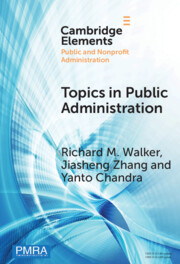Element contents
Topics in Public Administration
Published online by Cambridge University Press: 29 November 2024
Summary
Information
- Type
- Element
- Information
- Online ISBN: 9781009378697Publisher: Cambridge University PressPrint publication: 09 January 2025
References
References
Websites searched 15 December 2023 to collect information on journal aims and scope reported in the text.
Administration & Society: https://journals.sagepub.com/description/AAS
American Society for Public Administration: https://journals.sagepub.com/description/ARP
Environment and Planning C: Politics and Space: https://journals.sagepub.com/description/EPC
Governance: An International Journal of Policy, Administration and Institutions: https://onlinelibrary.wiley.com/journal/14680491
International Public Management Journal: www.tandfonline.com/action/journalInformation?show=aimsScope&journalCode=upmj20
International Review of Administrative Sciences: https://journals.sagepub.com/description/RAS
Journal of Public Administration Theory and Practice: https://academic.oup.com/jpart/pages/About
Local Government Studies: www.tandfonline.com/action/journalInformation?show=aimsScope&journalCode=flgs20
Public Administration: https://onlinelibrary.wiley.com/journal/14679299
Public Administration and Development: https://onlinelibrary.wiley.com/journal/1099162x
Public Administration Review: https://onlinelibrary.wiley.com/page/journal/15406210/homepage/productinformation.html
Public Management Review: www.tandfonline.com/action/journalInformation?show=aimsScope&journalCode=rpxm20
Public Money & Management: www.tandfonline.com/action/journalInformation?show=aimsScope&journalCode=rpmm20
Policy & Politics: https://onlinelibrary.wiley.com/journal/17471346
Public Performance and Management Review: www.tandfonline.com/action/journalInformation?show=aimsScope&journalCode=mpmr20
Social Policy and Administration: https://onlinelibrary.wiley.com/journal/14679515
Accessibility standard: Unknown
Why this information is here
This section outlines the accessibility features of this content - including support for screen readers, full keyboard navigation and high-contrast display options. This may not be relevant for you.Accessibility Information
- 3
- Cited by
